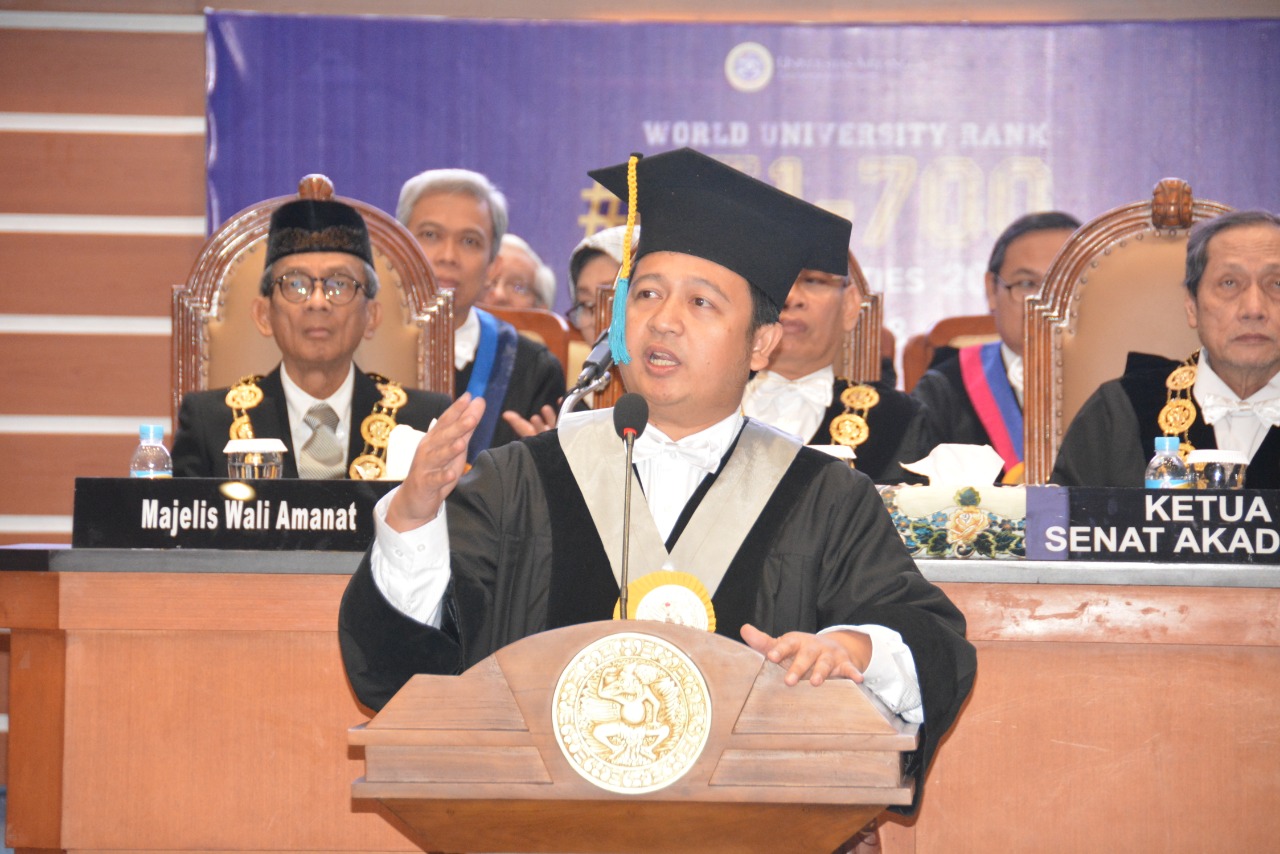UNAIR NEWS – Prof. Dr. Raditya Sukmana, S.E., M.A. was conferred as the 481st professor of Universitas Airlangga on Saturday, June 22, 2019. In his conferment, Prof. Raditya revealed the urgency of managing productive waqf in the Industrial Revolution (IR) 4.0 era.
“I realize that my conferment as a professor is a mandate and a big responsibility as a lecturer. A professor is the highest academic position, but that does not mean that this is the end point of our goal as lecturers, “said Prof. Raditya.
“It is a new challenge related to what we will contribute to the development of science after the conferment of this professorship,” added the lecturer of UNAIR Faculty of Economics and Business.
In his scientific oration, Prof. Raditya explained that waqf has now expanded in various sectors, such as waqf for Islamic banks, the stock market, and takaful. Waqf is not just for “religious institutions,” which only covers ritual religious matters, but it can for “socio-economic institutions” if their roles are optimized.
Waqf can be seen as an instrument for improving social utility after someone who gives waqf, sacrifices his personal utility. If an asset is given as waqf and the benefits of managing the waqf are used for the socio-economic empowerment activities of the community. Thus, management of waqf will encourage economic growth inclusively.
Potential and Benefits of Waqf
Prof. Raditya also mentioned the potential of cash waqf in Indonesia. As a country with more than 80% Muslims, Indonesia has a great welfare opportunity through implementation of Islamic economic systems such as waqf. One example is through cash waqf.
“We calculate from two hundred million Islamic communities in Indonesia, one hundred million of them are capable or sufficient economic groups. If one hundred million people each month gives one thousand rupiahs of cash, in a month the waqf we collect is one trillion,” explained the lecturer who had completed his master’s studies in the United States.
Productive management of waqf can bring various positive impacts, such as the provision of public goods non-fiscally, thereby reducing the government’s burden and budget deficit, providing employment (construction, marketing, information technology, accounting, and other fields), amal jariyah for the wakif. Provision of public infrastructure by waqf will reduce the burden on the government for infrastructure. The benefits of waqf in the fields of education and health can improve the quality of human resources and the quality of life of the communities.
Future of Waqf
Productive management by seeking economic added value while maintaining the principal assets’ conservation of the waqf and its benefits is an effort to return the waqf function to its origin.
Management of waqf in the future is inseparable from the dynamics happening in the community. One of them is the presence of the Industrial Revolution (IR) 4.0 that emphasizes innovation, decentralization, and automation to improve efficiency and effectiveness of production.
In the financial sector, the presence of blockchain as one of the innovations in IR 4.0 era received a good response. Blockchain is a technology that allows data to be stored and traced through a digital ledger system distributed to computers all over the world.
“The use of the blockchain in the management of productive waqf allows improvement of waqf management efficiency and effectiveness. If the wakif and nazir are connected to a blockchain system, then waqf donation transactions can be carried out with a high level of transparency,” he said.
Waqf as philanthropic instruments originating from Islamic law needs to be optimized through the management of productive waqf oriented to positive impacts on the economic, social and environmental sectors, not only guided by Shari’a but also adaptive to technological developments. (*)
Author: Zanna Afia Deswari
Editor : Khefti Al Mawalia





